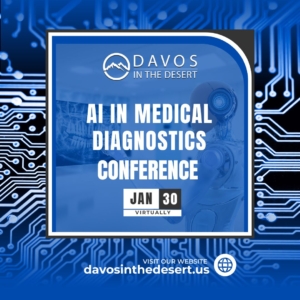AI in Medical Diagnostics
Conference Worldwide
Delivered – Virtually
January 30, 2025
 Welcome to the AI in Medical Diagnostics Conference Worldwide. Hear from CEOs of leading companies as they discuss how their businesses are harnessing AI to transform medical diagnostics. Listen to industry experts share groundbreaking advancements in AI-driven healthcare. Join us virtually on January 30, 2025, and gain unparalleled insight into the latest developments in medical diagnostics powered by AI.
Welcome to the AI in Medical Diagnostics Conference Worldwide. Hear from CEOs of leading companies as they discuss how their businesses are harnessing AI to transform medical diagnostics. Listen to industry experts share groundbreaking advancements in AI-driven healthcare. Join us virtually on January 30, 2025, and gain unparalleled insight into the latest developments in medical diagnostics powered by AI.
To be honest, it is not easy to quantify the size of the AI in Medical Diagnostics industry. However, one report projects the market will reach $10.6 billion by 2033, growing from $1.1 billion in 2023 at a CAGR of 25.2%.
The following are among the growth drivers for the AI in Medical Diagnostics industry:
- Increasing demand for AI-based solutions to reduce the workload on radiologists. There is a growing shortage of radiologists—up to 42,000 radiologists by 2033 in the United States.
- The growing global burden of chronic diseases is increasing demand for advanced diagnostic tools.
- Advancements in healthcare IT and imaging technologies.
- The imperative for reducing diagnostic errors and improving patient outcomes.
- Growing integration of AI with electronic health records (EHRs).
- The trend towards personalized medicine. AI facilitates analysis of large datasets to provide more tailored diagnostic and treatment approaches.
AI is rapidly transforming medical diagnostics, enhancing accuracy, speed, and efficiency across various areas. Here are some key trends in AI-powered medical diagnostics:
Enhanced Imaging Diagnostics: AI is revolutionizing medical imaging analysis, particularly in radiology. AI assists radiologists by highlighting areas of interest and detecting previously missed abnormalities. For example, AI algorithms have improved diagnostic accuracy in multiple sclerosis patients by 44% and reduced reading times.
Early Disease Detection: AI enables earlier and more accurate detection of diseases, in part, by analyzing large datasets to identify subtle patterns and risk factors. Real-world applications like PeraHealth’s Rothman Index have led to significant improvements, such as reducing sepsis mortality rates by 29% at Yale-New Haven Health.
Faster Diagnoses: AI significantly reduces the time required for image interpretation, allowing radiologists to focus on complex cases.
Reduction in Human Error: AI systems are immune to factors like fatigue or distractions that can affect human radiologists, offering consistent and error-free analysis.
Automated Measurements and Quantification: AI enables automated segmentation and quantification of lesions, allowing for reliable and reproducible longitudinal tracking of tumor size and volume.
Improved Diagnostic Confidence: By providing a “second opinion,” AI can increase radiologists’ confidence in their diagnoses. In one study, radiologists’ diagnostic accuracy increased from 79.1% to 81.5% with AI assistance, along with faster decision times and higher confidence scores.
The following are some fun financial facts with respect to the AI in Medical Diagnostics industry:
- In February 2023, GE Healthcare acquired Caption Health, an AI software company focused on cardiac ultrasound exams, to expand its ultrasound portfolio.
- In June 2023, Genomenon acquired Boston Genetics, a genomics interpretation and curation firm, to enhance its AI-enabled genomic platform.
- In 2023, Samsung Medison acquired Sonio, a fetal ultrasound AI software company, to improve prenatal care capabilities.
- In October 2023, Philips announced a collaboration with Quibim on AI-based imaging and reporting solutions for MR prostate exams.
- CARPL.ai partnered with Philips to integrate its AI orchestration platform with Philips’ Enterprise Imaging Solution across Brazil’s healthcare system.
- deepc formed a strategic partnership with ImagineSoftware to provide radiology AI solutions to ImagineSoftware’s network of healthcare organizations.
- GE HealthCare partnered with Medis Medical Imaging to enhance diagnosis and treatment of coronary artery disease.
Each management team will discuss their company’s existing and forthcoming product offerings. They will inform us of their research and development efforts, proprietary technologies and patent portfolios. They will shed some light on how they develop their algorithms and what benefits their AI yields. They will tell us about their business models including the extent of their collaborations, distribution channels, manufacturing strategies, breadth of their product portfolios and recurring revenues.
Please check back for the agenda of the presenting companies. If you would like to nominate a company to present, please contact David Wanetick at dwanetick@davosinthedesert.us.
Register now to listen to presentations from industry leaders and innovators. Registration is free for members of Davos in the Desert. Non-members can register now for just $10. No refunds.
Secure your spot today and be part of shaping the future of ai in medical diagnostics industry!
